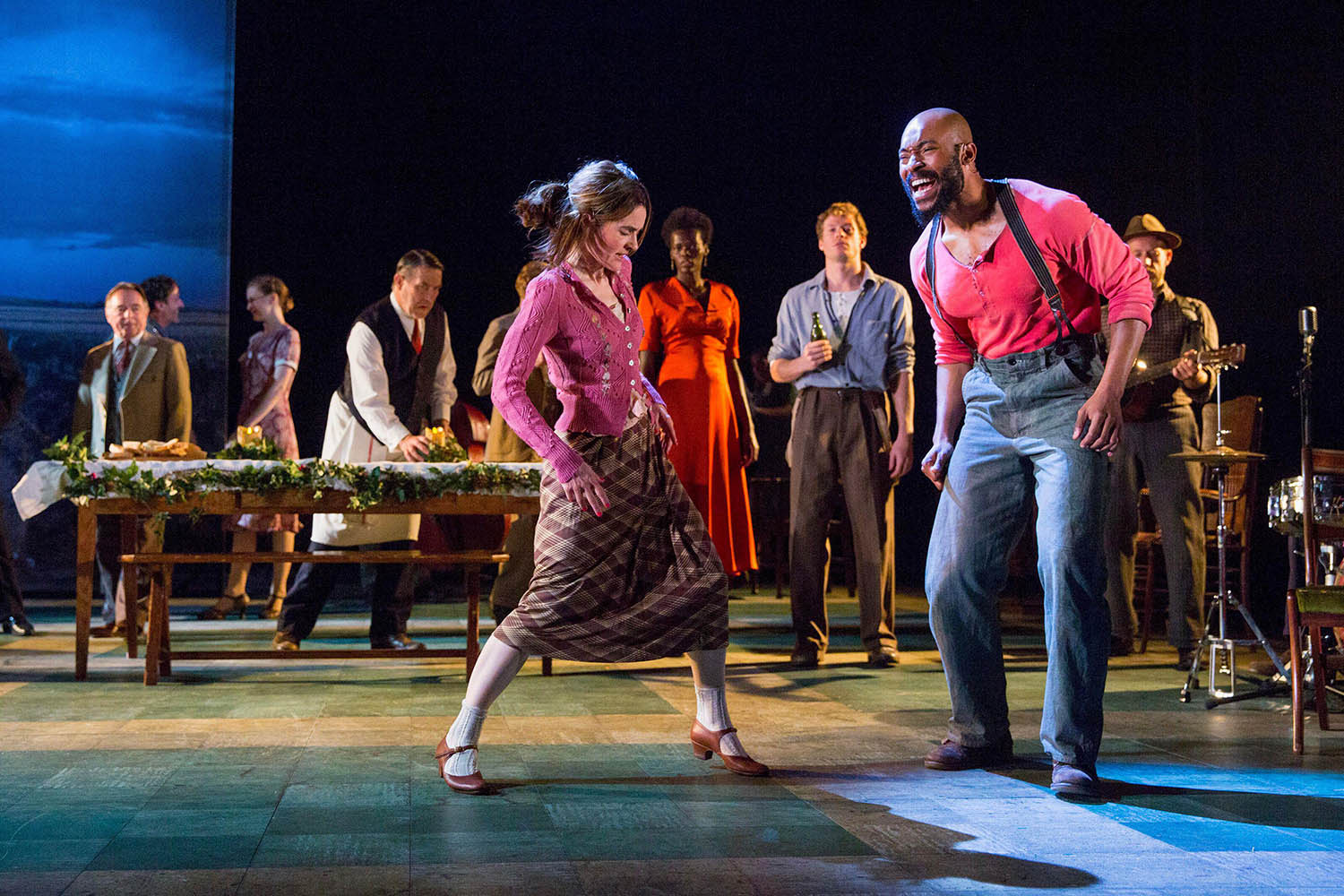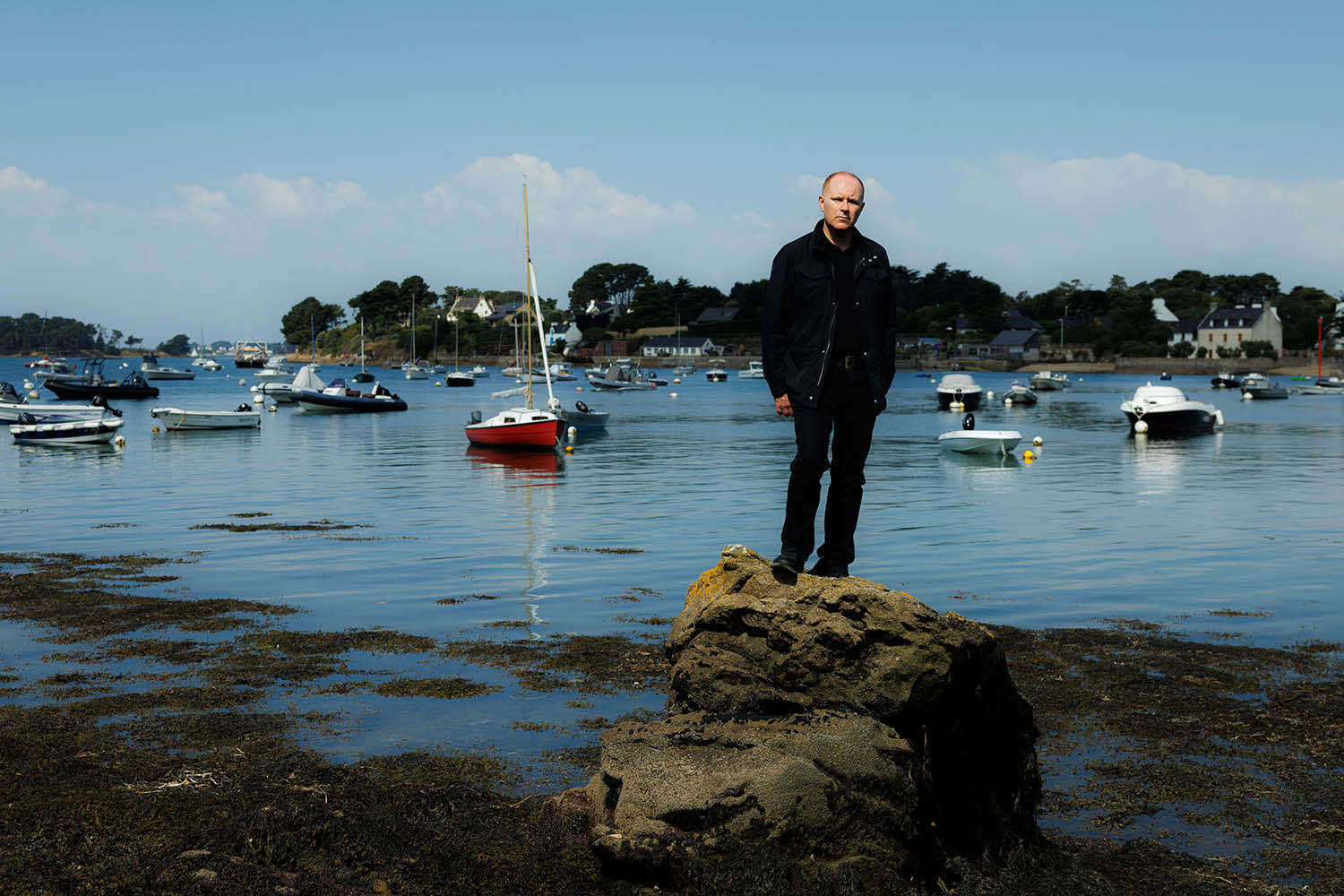The Irish playwright Conor McPherson has been living with Girl from the North Country, his sensationally popular Bob Dylan musical, since 2012, when he received an out-of-the-blue proposal to write the show from Dylan’s management. In all that time, he has never met Dylan, never spoken to Dylan, never directly communicated with Dylan in any way, shape or form. Yet he feels as if they have had an intimate relationship.
“I didn’t need to talk to him,” McPherson says. “I don’t know what we would have talked about. There’s the person Bob Dylan, who’s just a man. He’s the same as you and me. But then there’s the person who’s like a prophet or a god, who lives on some other plane that even he doesn’t understand. That’s the Bob Dylan I was communing with all the time. I was in his soul, working on that stuff. So,” he shrugs, “if I met Bob for a cup of coffee one time, that’s probably not the Bob I would get.”
McPherson is breaking off from a family holiday in Brittany to talk to me, which speaks to his crammed schedule. He recently debuted The Brightening Air, his first entirely original play in 12 years, at the Old Vic. Soon he will direct his 1997 masterpiece, The Weir, for the first time in Dublin and London, and witness the launch of his stage version of Suzanne Collins’s dystopian novel The Hunger Games. At the suggestion of Matthew Warchus, the Old Vic’s artistic director, he is also reviving Girl from the North Country for an eight-week summer run.
“It wasn’t planned this way,” he says affably. “I never know from year to year what’s going to happen. Like the Bob Dylan thing came out of nowhere. Something else will come along and crash into me like an asteroid and suddenly you’re in a different orbit.”
McPherson once described himself as “a nuclear reactor of anxiety”. The reactor is still running (“If you didn’t worry about something, you wouldn’t do it”) but it’s not smashing atoms with the same intensity. At 53, he has a soothing, avuncular solidity lit up by flashes of boyish enthusiasm and streaks of rhapsodic wonder. Given his flair for dialogue, it’s no surprise that he’s a fantastically engaging storyteller.
McPherson shares with Dylan an instinct for the numinous: The Weir is a night of fireside ghost stories; his 2004 play Shining City features a widower convinced he has been visited by his late wife; and Girl from the North Country is narrated by a dead man. He likes to work on the threshold between worlds, hovering in the unexplained.
“I think that’s true,” he says of the kinship. “The context is cosmic rather than political or geographical or historical. I’m trying to place the characters at the heart of the mystery of our experience. We know so little about anything, really. That sense of mystery certainly surrounds Bob Dylan’s work.”
McPherson was surprisingly undaunted when Dylan’s manager Jeff Rosen first got in touch because he’d never written a musical before and doubted it would actually happen. “It seemed so unlikely and so surreal. I’m always very pessimistic, if not fatalistic, about anything I do. I never think anything’s really going to work.” But walking through Dublin one day, he suddenly pictured a guest house in Duluth, Minnesota (near Dylan’s home town of Hibbing) during the Great Depression, which suggested an “adult nativity play” in the spirit of Eugene O’Neill. “And then I thought, that’s too weird; no one’s going to want that.” His agent convinced him to write a one-page pitch anyway. A few days later, he heard that Dylan wanted him to do it.
Dylan gave him the gift of complete freedom. Rosen said that the singer wouldn’t ask questions or give feedback because he didn’t want McPherson to feel obliged to please him. “So either Bob completely trusted me or he didn’t care what happened,” says McPherson. “And it was probably a mixture of both. He wanted it to be good but he also wanted it to be nothing to do with him.”

Shirley Henderson and Joe Scott in the 2017 production of Conor McPherson’s Girl from the North Country at London’s Old Vic
McPherson built a scaffolding of songs for the play. His Dylan collection, like that of many fans, got a little spotty after the 1976 album Desire but he loaded the entire catalogue on to his iPod and plucked out songs that spoke to him “in that deeper, sublingual way”. These were not the consensus classics of the 1960s but numbers from that divisive period between Street Legal (1978) and Empire Burlesque (1985), especially the trilogy in which Dylan embraced Christian fundamentalism, informing puzzled audiences that Armageddon was nigh. Why did that relatively unloved era resonate?
Newsletters
Choose the newsletters you want to receive
View more
For information about how The Observer protects your data, read our Privacy Policy
“There was no irony,” McPherson says. “He was getting into what he believed in. And that gave an incredible rigour to his songwriting. This is not the place he should go, and he goes there, and he couldn’t give two flying effs what people think. It’s all crazy and kind of brilliant.”
As anyone who has seen Dylan live can testify, he’s not precious about his material. He gave McPherson and arranger Simon Hale his blessing to rework the songs, splice them together, shuffle parts around, whatever they liked. “It was amazing!” McPherson grins. “It was like working with a songwriter who could give you anything you want.”
Matthew Warchus convinced McPherson he should direct Girl from the North Country himself. Right up until the first previews in July 2017, though, he wasn’t sure if it would work. “I thought, oh no, is anybody going to like this? Because the song choices were so esoteric. It was only when I saw the reaction of the audience I thought, oh wow, who knew? People are up for this!”
The show has since enjoyed the kind of success that only musicals can achieve: eight years of five-star reviews, awards and regional tours. McPherson has been involved with seven productions: “There’s always a new set of problems to be addressed,” he says. “That is not a challenge you really want to face all the time. It’s tough. But it’s still a privilege and it’s always a wild ride.” And the music, he says, is “spiritually sustaining. Not to be too witchy about it, but you do feel that energy coming off the work.”
Dylan himself saw it off-Broadway in 2020 and told the New York Times: “The play had me crying at the end. I can’t even say why. When the curtain came down, I was stunned.” He then invited some of the cast backstage one night when he was playing in New York and told them the show had made him reassess songs he hadn’t thought about for decades. McPherson was in Ireland at the time. Was he disappointed to miss out?
“Not really,” he says. “It was magical that it was happening at all. To get his imprimatur, that was the completion of that journey. Even if no one else in the world liked it.”
McPherson was 10 when he first discovered Dylan via Mr Tambourine Man in a teach-yourself-guitar book, and he kept encountering his influence through his favourite bands: “All roads led back to him.” In his teens he played guitar in a “pop-grunge” band inspired by the Byrds and Hüsker Dü, but a rock career was never on the cards. “I don’t know if I would have had the stamina,” he says. There was another, very Dylanesque reason: “If you’re a successful musician, you are under pressure to keep doing what you were doing 20 years ago. I like doing things and then moving on.”
When McPherson looks back over his theatrical career – a dozen original plays, adaptations of Chekhov, Strindberg and Du Maurier – there’s nothing he disowns. “They all have something,” he says. “I’m very proud of the road the work took. I think I can stand over it and say well, look, I honestly did my best. That’s quite a good feeling to have at my age.”
Raised on a Dublin council estate, McPherson had a hunger. He earned a double first in English and philosophy from University College Dublin and staged his first play, Rum and Vodka, while still a student. He was under the spell of David Mamet at the time: boozy, brawny monologues delivered by bitter, volatile men. I suggest that he must have been ambitious to move so fast.
“I really wasn’t ambitious,” he insists. “If you’re ambitious, you’re not writing plays. It’s so strange and so niche and so hard to get right. I was just bitten by the desire to write plays. I would see these things in my mind and be in the grip of them. It was like having a crush.”
Nor was he consciously competing with the other driven young men of 1990s theatre: Martin McDonagh, Jez Butterworth, Joe Penhall, Enda Walsh. “I don’t know if being competitive is going to help you unless you’re prepared to go through all the gates of potential disappointment that are ahead of you. It’s not a lot of craic.” He laughs as he remembers something Penhall once said to him: “Who knows if the magic is there? And even if it is, will the bastards see it?”

Members of the cast of The Hunger Games training for acrobatic and fighting scenes
The bastards certainly saw it in The Weir, a haunting storytelling tour de force that almost immediately appeared on a National Theatre poll of the 20th century’s most significant plays, tied with Endgame and A View from the Bridge. He is excited about bringing it back. “It’s from a different period, for sure, but it’s also three minutes ago. I can vividly remember sitting there writing that play. I’m still right there.”
McPherson was only 27 when it won the Olivier award for best new play. “I was so inexperienced,” he says. “Part of me was like, oh, this is what happens. You write a play and it goes on and everyone really likes it. Great! I was so naive that when The Weir opened on Broadway I didn’t go! I didn’t think it was important. I didn’t go to the Olivier A awards! Whereas now I think just to write a play with a beginning, a middle and an end is an achievement. Any play that goes on and on for decades, the odds of that are tiny.”
He thinks his naivety helped him to keep writing: five plays in under a decade, including Dublin Carol and Port Authority. “I was just banging them out. I wasn’t going around the world watching The Weir.”
It was in the first flush of success that his drinking escalated disastrously, climaxing in a burst pancreas and enforced sobriety in 2001.
“For a lot of kids my age in Ireland, that was the culture. I figured out quite early on, luckily for me, that it didn’t suit me. If I’d have been a teacher or a civil servant, I might have run into the same experiences.”
McPherson has written five movies and directed three of them but none has reached the level of his plays. “The route from that first idea to what appears on stage can be quite pure. With films, you never know,” he says, hinting at numerous disappointments and compromises. He admires McDonagh – the writer behind In Bruges and The Banshees of Inisherin – for having the ability “to actually get the film made in the way that you want and to protect it. That’s a whole talent on its own.”
The movie version of Girl from the North Country, announced in 2023, is currently in limbo. He thinks “a Bob Dylan musical that wasn’t about Bob Dylan”, with an expensive period setting, is a hard sell for Hollywood. Inevitably, he has received several offers to write songbook musicals. “It has to be the right thing,” he says. “I wouldn’t sign up if someone said we’ve got the catalogue of … I don’t know, Scritti Politti. There would have to be something to fascinate me.” Poor Scritti Politti.
McPherson did say yes, though, to adapting The Hunger Games, the young adult series that spawned several blockbuster films. (Collins, unlike Dylan, got on the phone to talk through McPherson’s subsequent pitch.) The producers have custom-built a venue in Canary Wharf. He liked the idea of writing something his 15-year-old daughter could enjoy. In the past, people would say to him, “‘My daughter’s 13. Do you think I could bring her to see your play?’ And I say, ‘No! That would be terrible!’” he laughs. “It’s great to able to relate to an age group that I live with and understand.”
McPherson told the producers he would only do it if it was pure theatre rather than a movie on stage. He is still intoxicated by theatre, with all its gruelling challenges and thrilling rewards. “The allure of having a play in a studio theatre for a four-week run is more exciting to a playwright then developing a big series on Amazon,” he says. “It just is.” He loves the whole journey from page to stage – the long, slow unveiling of what a play is really about.
“You really want something to happen in the audience – something beyond the words, beyond the story. You’re looking for something transcendent. But that’s very hard to conjure”
Three decades in, McPherson compares himself to an ageing stuntman. “You’ve got more scar tissue and you know what the risks are. You’re coming at things with a different energy. Having said that, when I get going, I’m as single-minded and driven as I ever was and the fire in my belly is exactly the same. The one difference is now I know what I’m getting into.”
Conor McPherson’s Girl From the North Country is on at the Old Vic until 23 August. The Weir runs at the Harold Pinter theatre from 12 September to 6 December
Photographs by Thomas Louapre/the Observer, Donald Cooper/Alamy, Story House PR

